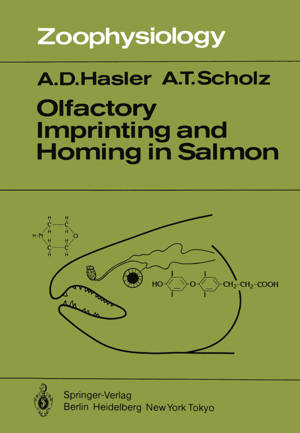
- Afhalen na 1 uur in een winkel met voorraad
- Gratis thuislevering in België vanaf € 30
- Ruim aanbod met 7 miljoen producten
- Afhalen na 1 uur in een winkel met voorraad
- Gratis thuislevering in België vanaf € 30
- Ruim aanbod met 7 miljoen producten
Zoeken
Olfactory Imprinting and Homing in Salmon
Investigations Into the Mechanism of the Imprinting Process
A D Hasler, A T Scholz
€ 131,99
+ 263 punten
Omschrijving
Chance Favors Only the Prepared Mind How does a scientist go about the task of pushing back the curtains of the unknown? Certainly the romance of tackling the mysteries of nature provides the motivation, for who would not be inspired by the remarkable life history of this romantic beast, the salmon. After living in the Pacific Ocean for several years, salmon swim thousands of kilometers back to the stream of their birth to spawn. I have always been fascinated by the homing migration of salmon. Noone who has seen a 20-kilogram salmon fling itself into the air repeatedly until it is exhausted in a vain effort to surmount a waterfall can fail to marvel at the strength of the instinct that draws the salmon upriver to the stream where it was born. But how does it find its way back? I was puzzling over this problem during a family vacation in 1946. Inspired by the work of the great German Nobel Laureates, Karl von Frisch and Konrad Lorenz, I had been conducting research with my graduate student Theodore Walker, since 1945, on the ability of fishes to discriminate odors emanating from aquatic plants. Von Frisch had studied schooling minnows and discovered that, if broken, their skin emitted a con specific chemical substance, termed Schreckstoff, which caused other members of its school to disperse and hide.
Specificaties
Betrokkenen
- Auteur(s):
- Uitgeverij:
Inhoud
- Aantal bladzijden:
- 138
- Taal:
- Engels
- Reeks:
- Reeksnummer:
- nr. 14
Eigenschappen
- Productcode (EAN):
- 9783642820724
- Verschijningsdatum:
- 8/12/2011
- Uitvoering:
- Paperback
- Formaat:
- Trade paperback (VS)
- Afmetingen:
- 170 mm x 244 mm
- Gewicht:
- 263 g

Alleen bij Standaard Boekhandel
+ 263 punten op je klantenkaart van Standaard Boekhandel
Beoordelingen
We publiceren alleen reviews die voldoen aan de voorwaarden voor reviews. Bekijk onze voorwaarden voor reviews.







